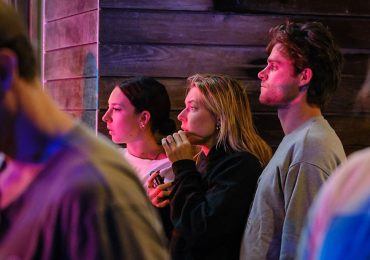Quantity, not quality, defined the Peak TV era, an original-content bonanza that began when streaming services started making their own shows in the mid-2010s and was on the wane by the time Americans emerged from pandemic isolation. But the flurry of production inevitably facilitated some deeply strange—and often great—projects. Netflix let cult comedian Maria Bamford make Lady Dynamite, a surreal journey into her mental illness. Starz greenlighted New Queer Cinema legend Gregg Araki’s Now Apocalypse, which was kind of like Melrose Place if it had horny lizard aliens. SNL writer Julio Torres sold HBO on Los Espookys, a Spanish-language comedy about four friends who execute elaborate horror hoaxes for a living.
[time-brightcove not-tgx=”true”]
Now Peak TV is over, the streaming industry is contracting, and executives have become increasingly conservative about the projects and voices in which they choose to invest their shrinking budgets. And yet, by some miracle, Torres is back on HBO, June 7, with his weirdest and most wonderful creation to date. Fantasmas (Spanish for ghosts) gets its title from a pitch writer and director Torres’ quasi-autobiographical protagonist Julio makes to Crayola, early in the six-episode series’ premiere, for a clear-colored crayon with that spectral name. But it applies equally to the show’s characters, offbeat dreamers set adrift in a society eager to commodify their identities and aspirations. The premise makes Fantasmas both a sparkling specimen of weird TV and a manifesto championing the existence of that possibly dying art.
Here’s the best I can do for you in terms of a plot summary: Julio, a New Yorker who has been avoiding urgent letters from his landlord, purchases and then promptly loses a precious gold oyster earring that is the exact size and shape of a worrisome mole on the side of his face. It wouldn’t be inaccurate to say that the series follows his search for the missing bauble, with dubious help from his agent, Martine Gutierrez’s Vanesja (the S is silent, and Vanesja’s career is actually a years-long performance art project), and robot secretary, Bibo (voiced by Joe Rumrill), who is also an aspiring actor. Julio’s profession is nebulously creative. As a result of being struck by lightning as a child, he explains, “I can feel the inner lives of shapes and colors and sounds and letters.” For example, Q, “which comes up way too early in the alphabet” and “should be all the way in the back with the fellow avant-garde letters: the X, the Y, the Z.”
This monologue, delivered in the back of a Chester—which is like an Uber, except its namesake driver (Tomás Matos) is a genderqueer eccentric resisting corporate domination—gives way to what, in a more typical SNL-adjacent comedy, might be described as a sketch. Steve Buscemi appears as Q, an aggressive, experimental-punk musician who’s booked on a bill between accessible, crowd-pleasing normies P and R. The audience revolts. Q spirals into self-destruction. But then weirdness triumphs as a band comprising W, X, Y, and Z rises to fame and cites Q as a seminal influence. What seems to be a fanciful digression is really Fantasmas in miniature: an oddball hero’s journey that illustrates the cultural value of the brilliant bohemian.
Such vignettes are the meat of the show, bound together by the connective tissue of Julio’s quest. Set in a New York whose look is equal parts Blade Runner, diorama art, and neon dreamscape, with Torres often zooming out to expose the constructedness of the sets, these stories take us on side quests with minor characters. Unwaveringly loyal to her employer, an insurance agency employee (Alexa Demie) who refuses to process Julio’s claim meets her sadomasochistic match in an airline’s customer service representative, played by Ziwe. Fantasmas is packed with bonkers TV parodies, from Bowen Yang as an elf suing Santa for unpaid labor to an alternate-universe Alf to a brain-breaking Real Housewives sendup starring Rachel Dratch, Rosie Perez, Cole Escola, and Emma Stone (an executive producer) in a Lisa Rinna wig. As you can see, guest stars run the gamut from Hollywood A-listers to underground icons: Julia Fox, Paul Dano, Natasha Lyonne, Amy Sedaris, Pose standout Dominique Jackson. Tilda Swinton, who starred in Torres’ recent movie Problemista, gives voice to a majestic toilet.
Like Problemista, which applied its creator’s fantastical eye to the labyrinth of immigration and the gig economy that leeches off the young, broke, and creative, Fantasmas is preoccupied by the bureaucratic apparatus that seeks to not just standardize but monetize identity. If the show has a villain, it’s a surveillance-capitalist nightmare called Proof of Existence—a monolithic new form of identification that collects every imaginable variety of personal data, charges a monthly subscription fee, and is fast becoming a requirement for obtaining everything from employment to housing. Julio wants to opt out, but the effects on his livelihood could be devastating. His lack of Proof forces him to hustle, which could mean scrapping ideas like a tragedy about that time a dolphin died in Brooklyn’s polluted Gowanus Canal in favor of autobiographical oppression porn. “No metaphors,” Vanesja coaches her client. “Just big, sad speeches. Call it Gaytino.”
People who loudly self-identify as weird can be tiresome; they’re often more affected than they are genuinely different. But Torres is the real thing—a visionary weirdo who delivers on the artistic, comedic, and political potential of outsider identity. What he’s resisting in, and through, Fantasmas is the reduction of diversity in art to a few boxes checked on a Proof of Existence application. Sure, he’s a gay Salvadorian American whose background has influenced his work. Yet his vital stats aren’t what define his comedy. It’s a brain that anthropomorphizes the letter Q and invents “the first and only queer hamster nightclub in New York City” and craves “an emoji that is one of the spoons from Beauty and the Beast finally getting turned back into a human but then realizing he’s still a servant” (as Julio explains: “That’s for when you get a promotion at work”).
Representation matters is the dead-eyed refrain of the flacks who nag Julio to abandon his crazy flights of fancy and just make Gaytino already. It certainly does, as TV turns away from the Bamfords and the Arakis it briefly embraced, but not necessarily in the way they mean.
Leave a comment








